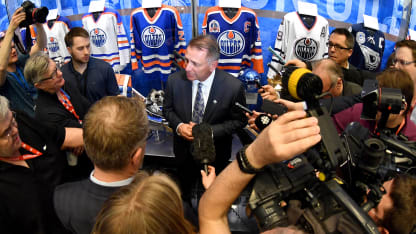Q: Heading into Free Agency, supplementary scoring was something that was high up on the priority list. Discuss that pursuit and where you think you are with that.
A: When I was announced two months ago, what I was hoping to accomplish in the summertime was to get another goaltender to go with Koskinen. Obviously, [Head Coach] Dave Tippett and Mike Smith were together in Dallas. He's a very, very competitive guy who can handle the puck. He's a motivated athlete. We talked to him a couple of times this week, so we feel good about our tandem in goal.
We wanted to create more competition. We need to find more players that can get double-digit goals. Markus Granlund is a player that I think for the last three years had 19, scored eight in about 53 games, then 12 goals last season. So we think his resume says he should be able to score double-digit goals. We've signed Joakim Nygard from Sweden, we've signed Gaetan Haas from Switzerland, signed Tomas Jurco who I drafted in Detroit, so we're trying to create more competition at the bottom part of the roster. We're also trying to have the bottom part of the roster play with more pace. We signed Jujhar Khaira to a two-year contract, so we think that we've started that.
I don't think that we're done, but that's the part of where we're at.
TALKING POINTS: Holland on NHL Free Agency
Oilers Pres. of Hockey Ops and GM Ken Holland fielded the media on the first day of NHL Free Agency

NHL FREE AGENCY

VIDEOS
OILERS TODAY | Free Agent Frenzy
RAW | Holland Free Agency Avail
AUDIO | Mike Smith Interview
AUDIO | Markus Granlund Interview
BLOGS
RELEASE: Oilers sign five players to contracts
BLOG: Oilers sign Chiasson to two-year contract
BLOG: Smith a firm believer in Tippett's coaching
BLOG: Smith expecting healthy tandem with Koskinen
BLOG: Oilers sign Khaira to two-year contract
BLOG: Oilers sign Markus Granlund to one-year contract
BLOG: Oilers sign Mike Smith to one-year contract
BLOG: Oilers sign Jurco to one-year contract
FREE AGENCY: Off-Season Movement Tracker
Q: You made the decision yesterday to buy out Andrej Sekera to create some cap space. You say you're not done, but a lot of these deals seem to be shorter term deals. Is that also a part of your mindset and approach?
A: The Sekera decision was tough. I don't know him, but certainly talking to all the people around here that have worked with him on an every-day basis, they hold him in the highest regard. One of the things that I learned in Detroit is that I have a great respect for pros - guys that are role models - and what was certainly laid out to me in Sekera. He's had a tough couple of years. I think he's played 60 games in the last two years combined. Obviously the injury bug has hit him big time, and I would say that we needed to create some cap space and some opportunity to do some things. I also think that we're trying to get some of the younger defencemen to have an opportunity heading into Training Camp, so that was ultimately the reasoning around the buyout.
On the one-year contracts, certainly that was part of the philosophy. I think what I said when I stood here two months ago was on the short term we want to compete for the playoffs in '19-20, and on the long term certainly the building is going to be about drafting and developing to push players through the system on to your roster. There're some young players here that are going to need some time, but I think they can be real important players to this team going forward. But in the short term, we need more competition. We want to get more pace to the bottom part of the roster. Obviously in Smith and Koskinen, we think we've got two goaltenders that we can create competition. Both are hard workers, both are really competitive, we believe they're going to push one another and play well and allow us to have goaltending as a strength.
Q: When you look at your defence now and what you have on the right side, and you look at guys who maybe aren't big puck movers, do you look at a Joel Persson, Matt Benning, or even a Caleb Jones to play on his off side and be the puck movers on your right defence this year?
A: Some of those questions are going to be answered in Training Camp. I think we need to get to Training Camp and we've got to play pre-season games. I think one of the reasons why at pick eight we took Philip Broberg is the importance of defence in the NHL today. So we've got Samorukov, we've got Bouchard, we've got Broberg, all young defencemen that are going to need some time. But we've got some defencemen in Bakersfield like Lagesson, Persson's coming over from Sweden, Jones, Ethan Bear, but they're players who can compete for spots in Training Camp. So I thought about that as I weighed whether or not we stood pat and didn't buy out Sekera or we did.
At the end of the day, we needed some cap space to try to create a little bit of opportunity to do something, but also the push of defencemen I think is one of the strengths of this organization. The top-four guys you're talking about, for the most part, you've got to do one of two things: draft and develop them or pay a tonne of money to get them. We don't have a tonne of money to get them, and I think we do have top-four defencemen, but I'm not sure that they're ready right now. But I believe they're pushing through the system.
RAW | Ken Holland Free Agency
Q: In Granlund, is the plan to have him as a centre even though he's played a lot of wing in Vancouver? Similar to Jujhar Khaira, where do you see those two fitting into the lineup?
A: He can play all three positions. I think he's most comfortable on the wing. He can play centre, and as we sit here today we obviously need a third-line centre. Gaetan Haas is a centre, Jujhar can play centre, Granlund can play centre, but certainly we're on the lookout to see if we can find another guy between now and Training Camp that can play centre.
Q: Did you have to circle back to Chiasson?
A: I circled back to him and his agent Pat Morris about two weeks ago, then talked to him early this week. He had 22 goals, he's popular in the locker room, and he's a right shot. We wanted to explore the market, and I think in the cap world what you try to do is get the most bang for your buck in every signing. Not everyone works out. We wanted to explore the market, but I stayed in touch with Pat Morris.
Pat and I sort of had a joke today when we talked to Alex. I think this week Pat Morris might've called me at 10 o'clock every night Sunday through Friday, and Alex Chiasson was one of the people that we talked about. So I've been in touch with Alex's camp all week.
AUDIO | Markus Granlund Interview
Q: Are you still looking for a winger to play with Ryan Nugent-Hopkins?
A: Always looking.
Q: Was Nyquist too expensive? Because you know him from Detroit.
A: It's a big number. I'm happy for Gus, I like him. When you look at our team and you put down what's committed, it was a big number for us.
Q: You mentioned you do have some cap room at your disposal. How close do you want to get to the cap before Training Camp , and do you envision now it'll be a trade that you'd have to make to augment the lineup aside from a free-agent signing?
A: I think when we get to Training Camp, you'd like to be at least a million-and-a-half. You'd like to have a player. Ideally, you'd love to be a million to two million below the cap so you can bring up a couple of players at any time depending on what their cap number is.
Q: When we build your lines on a notepad today, your top six still has maybe a couple bottom six guys in it, maybe a couple of guys - certainly a guy like Nygard - who has never played here. How much work does it need before it can get a passing grade in your top six by Training Camp?
A: I won't give any grades until Training Camp. Until I watch the players on the ice, I wouldn't have a clue. I got to watch them play. Certainly, we'd like to add another player that has the potential to score 20 goals. We'll see if we can make that happen.
Q: Ken, the agent for Brett Connolly mentioned that Edmonton was certainly in the mix here. Wayne Simmonds might have made sense, especially given the term length of his deal. Is it a different challenge in Edmonton - not that it's Edmonton just that it's in the West - versus guys that have spent a number of years playing in the Eastern Conference. Does it limit the pool a bit?
A: I didn't find that at all. I think at the end of the day your decisions are cap-related today. And I think at the end of the day, all the names that you're going to mention up front - other than the guys that commanded eight, nine, 10 million dollar salaries - for the most part I talked to all of them or their agents, for sure. I think that it was cap-related. It's about how much cap space you got. Those teams today that made a lot of noise had a ton of cap space and it goes in cycles. Somewhere down the road, we're going to have a ton of cap space and somebody else isn't going to have a ton of cap space. Right now, we don't have a ton of cap space. But certainly, when you've got the core of players here that this organization's got, it's very intriguing to players outside to play with those kinds of players.
Q: It's your first time in this fishbowl. In this particular one, can you contrast what these last two months have been like for you? Is there a sense of disappointment in what you were able to deliver today?
A: I try to make decisions with no emotion. I would say to you I try to live in a cocoon as much as I can. We were here every day from Sunday - showed up here at 7:30 AM and went home at 7:30 PM - worked the phones, talked to people, had our lineup on the board, looked at our cap space, looked at our commitments and looked at the other side of the board with our prospects to project when those players would hit this side of the board. We did that Sunday, Monday, Tuesday, Wednesday, Thursday, Friday, Saturday, Sunday then you wake up today. To me, it's about the process. Every day going about the process that eventually when you got to make a decision, you've made a decision based upon all the information at hand. And unless you sit in that room and you're in the room with the 31 organizations, you don't have all that information. I've been on the phone with the agents, I've talked to every general manager in the National Hockey League, looked at the board, looked at everything and you eventually make a decision based upon all that information. Lots of people don't have that information. The information that I've got at hand. I don't have any disappointment whatsoever. We made the decisions based upon all the information at hand.
AUDIO | Mike Smith Interview
Q: To paraphrase, you kind of said that to be in the free agent game, you have to be willing or comfortable to overpay or else you're not going to be in the game. Today, did you feel the players that commanded the money they did was too out of your price and comfort range?
A: No, I don't think so. Based upon all the information, whatever decision I made or didn't make was based upon a lot of research, a lot of talks, a lot of planning, looking forward and trying to determine where we are today and where we want to get to. I've been a manager for 22 years. I know when it's time to pay and when it's time not to pay. But I also know that every decision we talked about - not every decision works out but you got to go through a process eventually to make your decisions.
On the short term, we're trying to compete for a playoff spot in '19-20 but ultimately, I'm trying to oversee and build this team into being a really good, elite team in the Western Conference. And we made decisions today based upon those plans.
Q: Ken, you signed Khaira to a two-year contract. You did that because he's your own player? You haven't seen much of him and you're hoping he breaks through?
A: Yeah, he had 11 (goals) the year before. You need dimensions. Everybody's not the same size and the same skill set. He's a big guy that brings a different dimension to our hockey club. He can play centre, he can play left wing. He's a big guy. I lived in Detroit, I'm certainly listening to the information of the people that are here on an everyday basis. He had 11 goals two years ago, he had a tough year last year with three goals. When you look at a guy in the record books, lots of players, in some years they don't have very good years statistically. So, we're expecting him to bounce back and be closer to the player he was two years ago.
Q: Where are you on Puljujarvi?
A: I've talked to a lot of teams. Not sure where I'm at but I've talked to a lot of teams about a lot of different ideas about Jesse. I'm not sure where it's going to go. We'll see.
Q: Just to follow up on that, Ken. Are you playing the patient game with that?
A: Well, I think when I make a decision, it's got to be in the best interest of the team. Until there's something that I think makes really good sense to our team, I won't pull the trigger. Certainly, he's expressed frustration and disappointment at the way things have gone in his Oilers career. You guys talked to his agent 10 days ago or something and I don't think he's planning on playing for the Edmonton Oilers. But I've had players tell me that in Detroit and they did play in Detroit. And in some cases, they've told me that and they didn't play, and I ended up trading them. But ultimately I think the most important thing is if I do trade him, it's got to be a deal that I feel good about. That I feel is in the best interest of this team. If something like that isn't out there, then Jesse's going to have to make a decision.


















